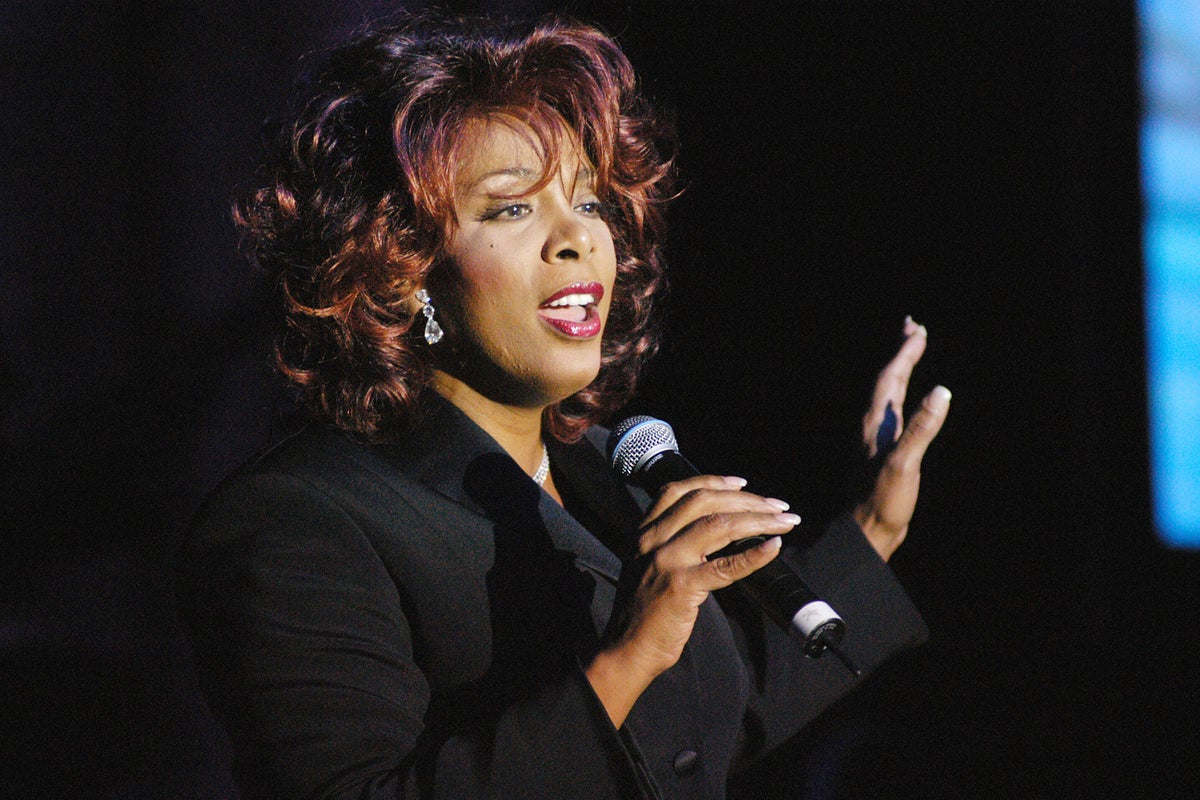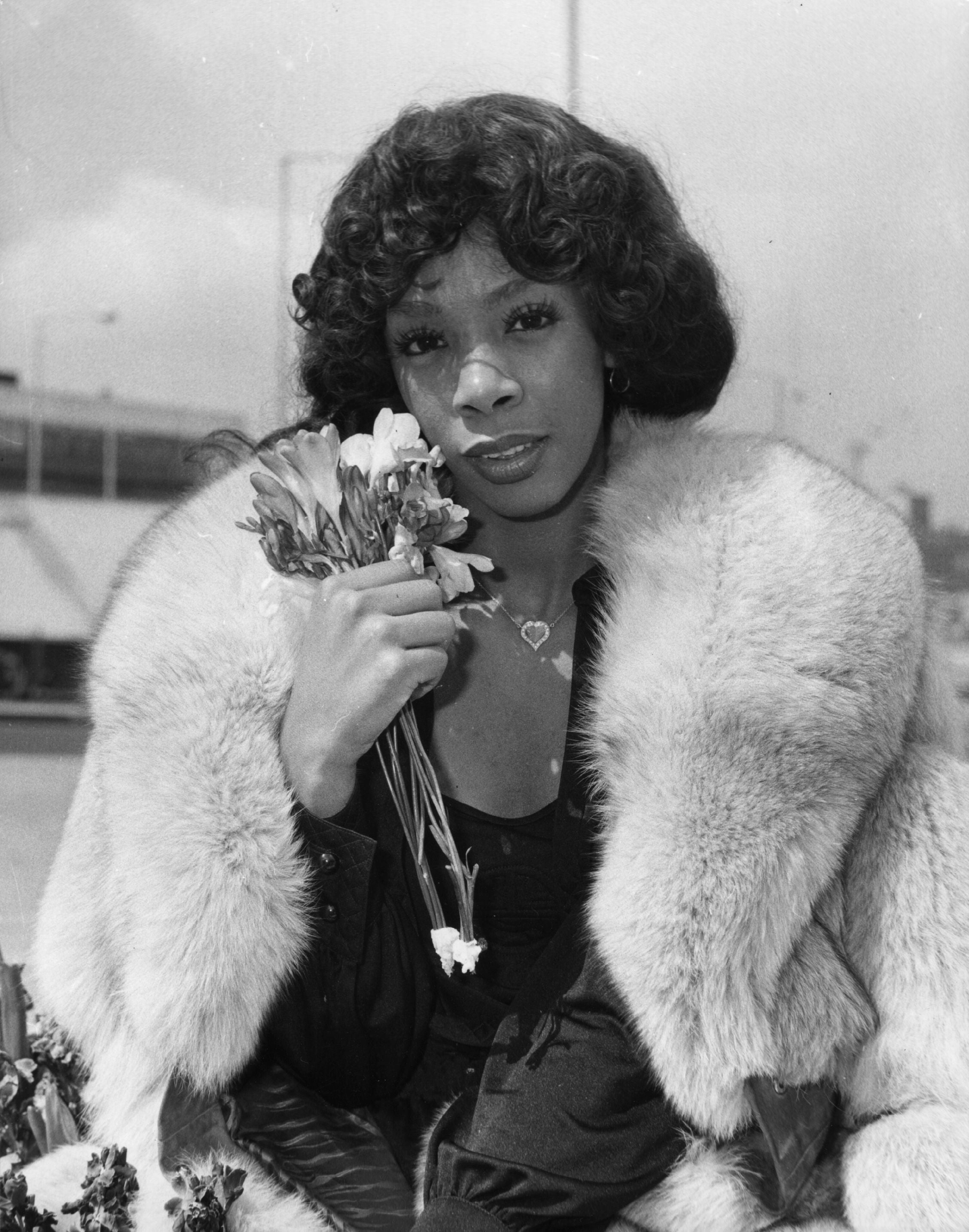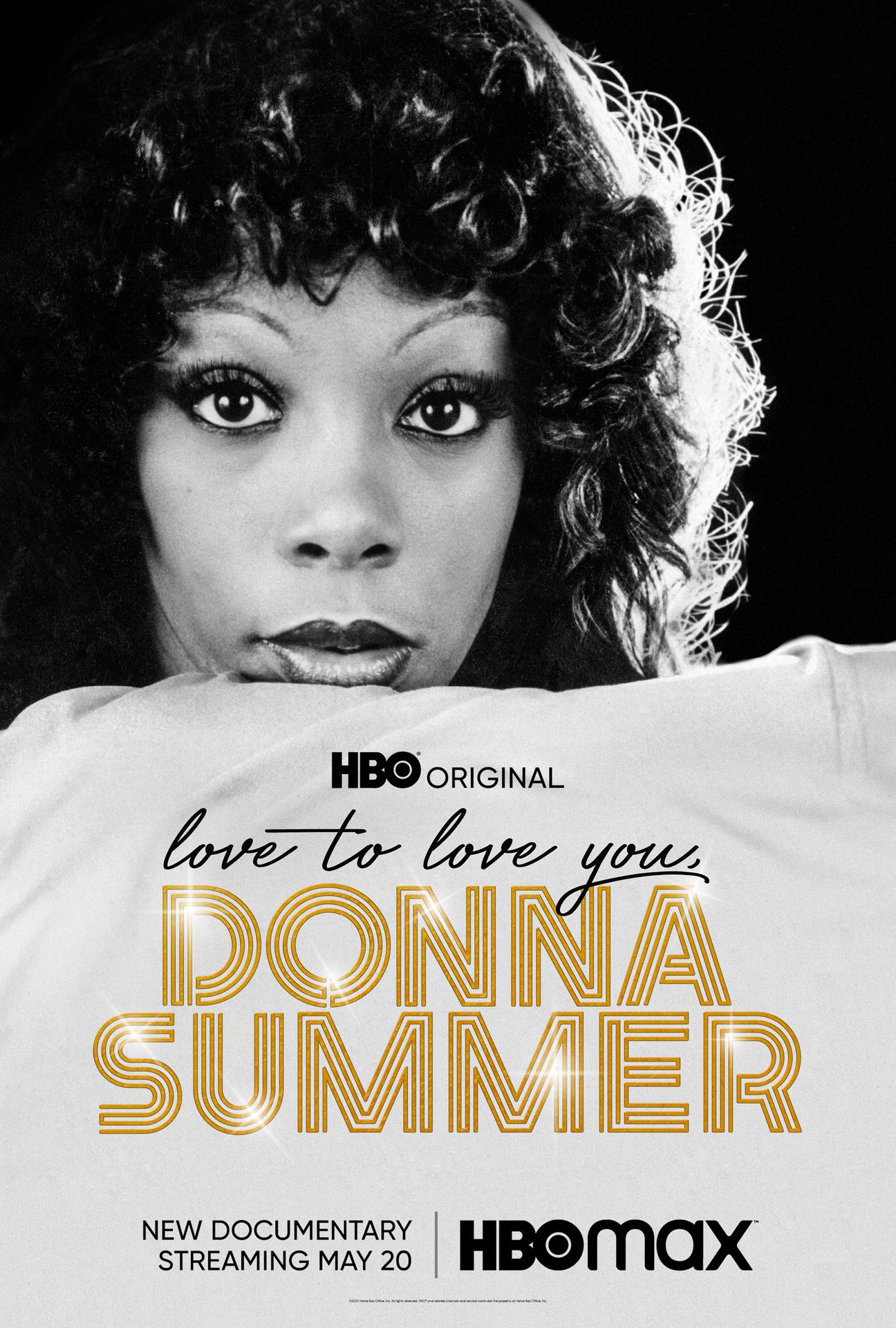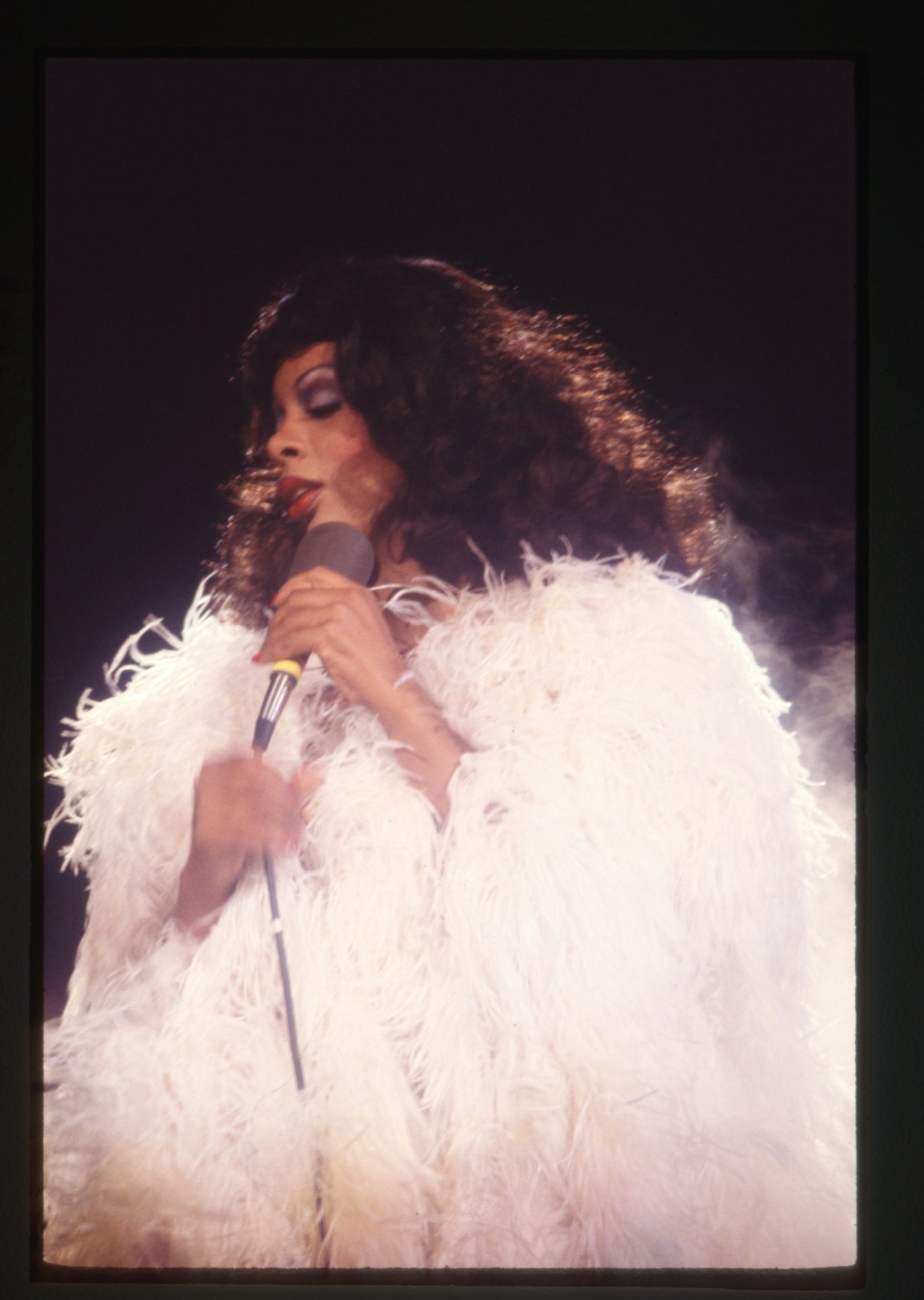
An uncommonly frank new documentary about Donna Summer begins with a series of intimate moans the whole world knows. They’re the sighs and groans that famously undulate through “Love to Love You Baby”, the 1975 worldwide smash that both made Summer a star and altered the course of dance music history. As the song plays in the background, the camera focuses on a tight close-up of Summer’s eyes; wide and innocent, searching and lost. The contrast between the worldly sound in the recording and the child-like image of the actual Summer mirrors the deep contradictions in her life, epitomising the knot of ideas and emotions this film works hard to unspool.
The relationship between the filmmakers and their subject, who died of lung cancer in 2012, helped immeasurably on that score. The co-director of the film, titled Love to Love You, is her daughter, Brooklyn Sudano, who coaxed several generations of her family to open up on camera. They include the singer’s siblings, her husband – the songwriter Bruce Sudano – as well as the co-director’s sisters.
Vintage interviews with the singer’s parents, along with many that had been taped over the years with Summer herself, coalesce into a nearly two-hour film that is less a conventional music documentary than a forensic dive into a family’s inner workings. The result surprised even the director at times. “When you think your family is one thing and you’re getting this new information that the dynamic was completely different, it shakes you,” Sudano tells me ahead of the film’s release on Sky later this month. “In this film, you’re watching a family have a conversation for the first time about things that are difficult to talk about,” says her co-director, Roger Ross Williams.
Although the film covers in detail the most creative, historic and glamorous aspects of Summer’s life, it also dives into the multiple generations of sexual abuse Summer and her family suffered and the cascading traumas she faced as a result. There’s also discussion of physical assaults, a fractious lawsuit and, at one point, contemplation of suicide by the singer.
Much of the drama in Summer’s life can be traced to a foundational experience in which her faith was tainted by a deep betrayal. Growing up in a working-class neighbourhood in Boston, Summer spent much of her early life in church, where she first began to sing. Crucially, it was also the place where she was abused at age 15, something Summer kept secret for decades.
“The church was where she found her voice,” Williams says. “But then, to be sexually abused by the pastor of that church while still trying to hold on to faith, that’s a huge struggle.” That Summer would later find fame through a song centred wholly on carnality, cementing her image as an erotic goddess to many forever, only compounded that struggle. “That was going against her natural personality,” Sudano says. “She was never the pretty one. She was the class clown.” She was also the theatrical one, an interest that led to her first breakthrough.
Immediately moving to New York City after having graduated high school in 1967, Summer auditioned for the musical Hair and won a part in the self-labelled “tribal love-rock” production in Munich. Her attention to detail helped her master the German language quickly, and there she thrived both professionally and personally, cutting solo singles while marrying a fellow member of the Hair cast and having her first child.
In 1975, Summer began working with local producer Giorgio Moroder, with whom she wrote and recorded a demo titled “Love to Love You Baby”, an erotic ode that Summer felt would be better suited to another singer. For that reason, she approached her performance in the song as an actor rather than a singer. Once Moroder heard her very convincing moans in the demo, however, he persuaded her to let it be released as a single.
At the same time, American entrepreneur Neil Bogart, who had just started a new label called Casablanca, was on the hunt for recordings that would shock and excite. (He also signed Kiss). Summer’s provocative song more than fit the bill. Testing its appeal to his associates, Bogart discovered that “Love to Love You Baby” had such a hypnotic effect on listeners that no one wanted it to end. As a result, he extended the song to nearly 17 minutes, a groundbreaking length for a dance single at the time.
The song caused a commotion, inspiring a ban by the BBC, whose censors somehow calculated that the track contained 23 orgasms. Regardless, it broke the Top 5 in both the US and the UK, aided by Casablanca Records’ decision to aggressively market its singer as “the first lady of love”. Not only was Summer uncomfortable with the image, but it also played into a long-standing and troubling hyper-sexualisation of Black women.
Sudano says her mother was “100 per cent” aware of that stereotype and upset by it. “Everybody wanted to put her in a box,” she says. “She was very specific and determined to push back against that. She was also saying, ‘You don’t need to put any of us Black women in a box’.”

Towards that end, Summer began to quickly expand the kind of material she performed, adding a medley of songs from the 1940s to her live shows and cutting pop standards such as “MacArthur Park” in 1978. Even the way Summer used her voice broke stereotypes. Though she was schooled in gospel music from her church years, Summer didn’t decorate notes with the elaborate melismas common to the genre. Instead, she sang the melodies straight on, trusting the essential character of her voice, and the raw passion in her delivery, to individuate the performance.
“That was something we actually spoke about,” Sudano says. “A lot of artists would do lots of licks and leaps, but I remember her saying, ‘If you do too many acrobatic leaps, you’re taking away from the core moment. I want to hit the note in a way so people will feel it’.”
Summer was equally purposeful with the compositions she sang. The documentary makes clear just how deeply involved she was in the songwriting process, including devising key hooks for some of her most iconic hits. She was the one who brainstormed that spiralling pulse of a motif that Moroder used to historic effect in “I Feel Love” (1976), in the process creating a blueprint for the future of electro-dance music. But if her creativity paid off commercially, it also drained Summer’s energy and left her zero time to raise her first daughter, Mimi, whom Summer eventually entrusted to her parents to care for instead.
“That led to an abandonment issue,” Sudano says of her older sister. Summer later wrote “Mimi’s Song” about the situation. “I bet you ask yourself/ Why I’m never there,” croons the singer on the track. “She was trying to reckon with that guilt,” Sudano adds.
I know I’m the bad guy in this story— Peter Muhldorfer, an ex of Summer’s who was abusive towards her
The singer’s romantic life was equally fraught. Having divorced her first husband shortly after Mimi was born, Summer found herself drawn to men who were extraordinarily creative but abusive. Several of them beat her. “When you have trauma very early on in life you have certain insecurity and self-worth issues,” Sudano says. “Sometimes you choose people who mirror that back to you.”
In a coup, the film features an interview with the man who was most violent towards Summer, Peter Muhldorfer, who expresses deep regret in his segment. (Muhldorfer died shortly after the interview). “I know I’m the bad guy in this story,” he told Sudano, who said that their conversation had provided “closure for him.”
Summer’s emotional and physical exhaustion culminated in suicidal thoughts. One night, she considered jumping from a hotel window in New York. Only the surprise intrusion of housekeeping caused her to pull back. The singer battled with her record company, as well. Though she was grateful for their unwavering support of her career, which resulted in six smash albums in five years, Summer believed that she was poorly compensated for her work. In a vintage interview from that time featured in the film, she compares working in the music industry to being “raped over and over”.

As a result, she sued Casablanca and won, thereby becoming one of the first artists to regain ownership of their master recordings. It was hardly the first time she would make history. In 1978, Summer became one of the first Black women to land on the cover of Rolling Stone (the few earlier ones included Tina Turner in 1967 and the group Labelle in 1975). She was the very first Black woman to have a music video aired on MTV with her ode to working women, “She Works Hard for the Money”.
That hit did a lot to help Summer put her sex queen image behind her. Moreover, she finally found good love with her songwriting partner, Bruce Sudano. Around that time, she also began to reaffirm her religious belief and became increasingly vocal about it, a stance that contrasted so sharply with her earlier image that it caused increasing discomfort in the secular world of pop. That disconnect exploded into genuine controversy after an infamous incident in which Summer said from the stage one night, “God made Adam and Eve, not Adam and Steve”, a line that had been popularised by the most prominent anti-gay activist of the day, Anita Bryant. Given the fact that her fanbase began, in large part, within the gay community, the line wounded many.

The film covers that statement, which Summer did deliver, as well as an interview in which she allegedly said that Aids was God’s punishment. Summer vigorously denied saying anything like the latter in a subsequent press conference. Regarding the former quote, however – about Adam and Steve – Sudano says: “I think she intended it to be something flippant. She wasn’t giving some diatribe. But she realised very quickly that’s not something you should say.”
While the incident proved a major setback to Summer’s career, she suffered an even deeper hurt on the home front when she was informed that Mimi had been abused by a relative of the family’s housekeeper. “She herself had been abused, so it was a huge trigger,” Williams says. “As a mother you feel like you failed,” Sudano adds. “She was so protective of us. To have this happen felt like a huge blow.”
While Summer continued to soldier on by touring, she pulled back from regular recording in the mid-Nineties. Twenty years later, while living in Nashville, she was diagnosed with the cancer that took her life at 63. Despite the sadder aspects of Summer’s story, the directors believe their film carries a positive message through the star’s fortitude and brilliance. They also believe Love to Love You could provide encouragement to others. “I hope that by being honest and by sharing our story that people will see that they may be able to do that in their own lives,” says Sudano.
‘Love to Love You’ will debut on Sky TV in the UK and MAX in the US on 20 May
If you’re worried about a child, even if you’re unsure, you can contact professional counsellors at the NSPCC for help, advice and support by emailing help@nspcc.org.uk or calling 0808 800 5000. For those aged 18 or under, Childline offers free, confidential advice and support whatever your concern and whenever you need help. Call 0800 1111 or Contact Childline.
If you or someone you know is experiencing domestic abuse, you can call the 24-hour National Domestic Abuse Helpline, run by Refuge, on 0808 2000 247, or visit their website here.







